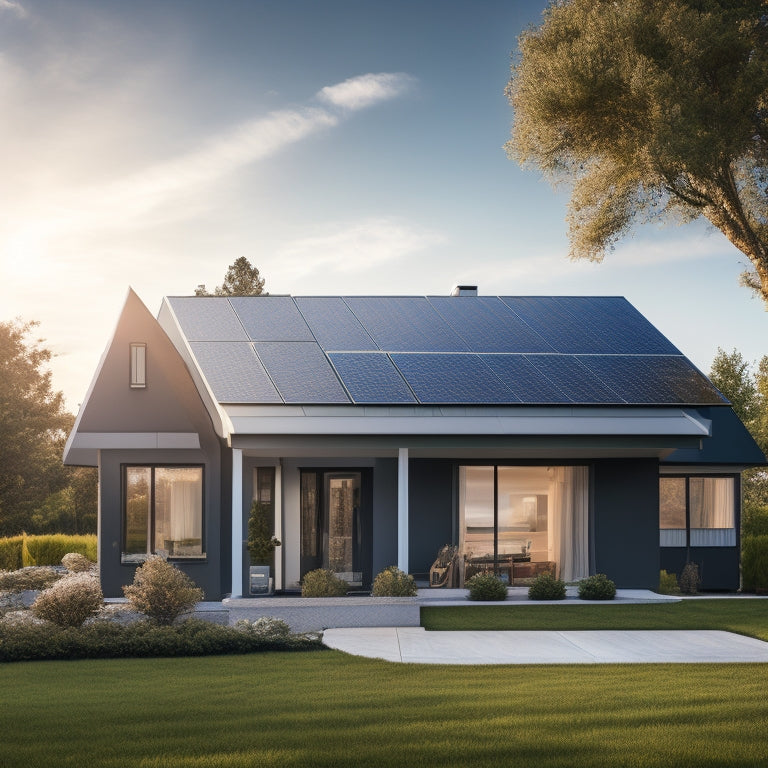
Home Solar Panels
Share
With home solar panels, you can greatly reduce your energy costs and increase your property value. By generating renewable energy, you'll lower your electricity bills and benefit from tax incentives like the Solar Investment Tax Credit. Efficient inverter technology converts DC power to AC for home use, maximizing energy harvesting from your solar panels. To get the most out of your system, it's crucial to assess your roof's shading impact and consider advanced PV technology. As you delve into the world of home solar panels, you'll uncover how to optimize energy conversion rates, achieve energy independence, and minimize your carbon footprint - and that's just the beginning.
The Essentials
- Home solar panels reduce energy costs and enhance property value, with tax incentives and decreasing installation costs making them more accessible.
- Solar panels provide energy independence by generating clean energy, reducing reliance on the grid, and contributing to significant cost savings.
- Renewable Energy Certificates track and verify generated renewable energy, allowing homeowners to sell excess energy back to the grid.
- Efficient inverter technology and advanced PV technology maximize energy harvesting from solar panels, ensuring optimal energy conversion rates.
- Roof assessment and shading impact analysis are crucial for optimal energy production, considering physical obstructions, seasonal sun angle variations, and roof material integrity.
Save Money on Electricity
You can greatly lower your electricity bill by utilizing the power of the sun with home solar panels.
By generating your own renewable energy, you'll reduce your energy costs and enjoy considerable savings over time.
Additionally, with Solar Power and Battery Storage systems, you can break free from reliance on the grid and reduce your electricity bills, allowing you to reap substantial cost savings while taking control of your energy needs.
With solar panels, you'll be able to cut your reliance on the grid and watch your electricity expenses shrink.
Lower Your Bill
Electricity costs are a considerable expense for many homeowners, and finding ways to reduce them can make a substantial difference in your monthly budget. By installing home solar panels, you can lower your electricity bill and enjoy considerable savings.
The cost of solar panels may seem prohibitive, but with the help of tax incentives, you can recoup a considerable portion of the installation costs. For instance, the Solar Investment Tax Credit (ITC) allows you to claim a tax credit of 26% of the total installation cost. This can considerably reduce the upfront cost of going solar.
In addition, solar power installation provides a modern, sustainable alternative to traditional energy infrastructure Renewable Energy Solutions, which is often outdated and inefficient. Additionally, many states offer additional incentives, such as rebates and property tax exemptions, to encourage homeowners to switch to renewable energy.
With the cost of solar panels decreasing over the years, it's now more affordable than ever to make the switch. By generating your own electricity, you can reduce your reliance on the grid and lower your electricity bill.
With the right installation, you can enjoy considerable savings and a reduced carbon footprint.
Reduce Energy Costs
Frequently, homeowners are surprised by the significant impact that solar panels can have on their energy costs. By utilizing the power of the sun, you can reduce your reliance on the grid and lower your energy bills. This not only saves you money but also contributes to a cleaner environment.
Here's a breakdown of the benefits:
| Benefit | Description |
|---|---|
| Energy Independence | Reduce your reliance on the grid and have control over your energy costs |
| Lower Energy Bills | Save money on your electricity bills by generating your own clean energy |
| Environmental Impact | Contribute to a cleaner environment by reducing your carbon footprint |
| Increased Property Value | Installing solar panels can increase the value of your property |
| Low Maintenance | Solar panels require minimal maintenance and can last up to 30 years |
Renewable Energy Certificates
You produce renewable energy with your home solar panels, but how do you track and verify it?
With the increasing adoption of residential solar power systems, the importance of monitoring and validating your clean energy production can't be overstated renewable energy systems.
Renewable Energy Certificates (RECs) are the answer, providing a system to track the amount of renewable energy you generate and allowing you to sell any excess to the grid.
Renewable Energy Tracking
How do you guarantee that the clean energy generated by your home solar panels is accurately accounted for and valued? Renewable energy tracking is the answer. This process involves monitoring and verifying the amount of clean energy produced by your solar panels, ensuring that you receive the proper credits and incentives.
With renewable energy tracking, you can rest assured that your contribution to a cleaner environment is recognized and appreciated.
Renewable energy tracking is made possible by solar technology innovations that enable efficient energy monitoring. Advanced systems can track energy production in real-time, providing you with a detailed record of your energy output.
This data is essential for verifying the authenticity of renewable energy certificates (RECs), which represent the environmental attributes of one megawatt-hour of renewable energy.
Certificate Trading Benefits
Utilizing the benefits of renewable energy certificates (RECs) lies in their tradable nature, allowing you to capitalize on your home solar panels' environmental attributes. Through certificate trading, you can monetize the green benefits of your solar panels, giving you more control over your energy production and consumption.
| Benefits | Description |
|---|---|
| Increased Revenue | Sell your RECs to companies seeking to offset their carbon footprint |
| Market Flexibility | Trade RECs on the open market, taking advantage of market activity |
| Environmental Impact | Contribute to a cleaner energy grid, reducing reliance on fossil fuels |
| Enhanced Property Value | Enhance your property's value with the added benefit of renewable energy credits |
| Government Incentives | Take advantage of tax credits and incentives for renewable energy producers |
Efficient Inverter Technology Explained
You're likely aware that solar panels produce DC power, but your home runs on AC - that's where efficient inverter technology comes in.
To maximize energy harvesting, you need an inverter that can track the maximum power point of your solar panels, ensuring you get the most out of your system.
With a reliable off-grid power systems setup, you can store excess energy for later use.
High-frequency conversion efficiency is also essential, as it minimizes energy losses during the DC-to-AC conversion process.
Max Power Point Tracking
As the sun's energy hits your solar panels, its output varies constantly, affected by factors like cloud cover, temperature, and time of day; consequently, your inverter needs to adapt quickly to capture the maximum power available. This is where Max Power Point Tracking (MPPT) comes in - an essential solar optimization technique that guarantees your inverter extracts the most energy from your solar panels. MPPT works by continuously monitoring the panel's output and adjusting the inverter's operating point to match the maximum power point.
| Scenario | Energy Yield | Energy Loss |
|---|---|---|
| No MPPT | 80% | 20% |
| MPPT with 1% accuracy | 95% | 5% |
| Advanced MPPT with 0.1% accuracy | 99% | 1% |
High-Frequency Conversion Efficiency
Your solar panels' ability to capture maximum energy relies not only on MPPT, but also on the inverter's capacity to efficiently convert DC power into AC. This is where high-frequency conversion efficiency comes into play. A high-efficiency inverter is essential in ensuring that the energy utilized by your solar panel materials is successfully converted into usable electricity for your home.
High-frequency conversion technology has revolutionized energy conversion technologies. By operating at higher frequencies, these inverters minimize energy losses, resulting in increased efficiency and reduced heat generation.
This, in turn, leads to a longer lifespan and improved reliability of the system. Additionally, high-frequency conversion enables the inverter to respond quickly to changes in your solar panel's output, ensuring that maximum power is extracted and converted into AC.
With high-frequency conversion efficiency, you can rest assured that your solar panel system is operating at its best level, providing you with the freedom to generate your own clean energy and reduce your reliance on the grid.
Assess Your Roof's Shading
When evaluating your roof's shading, you'll need to identify obstacles that could impact your solar panel system's performance.
Consider incorporating renewable energy solutions to maximize your system's efficiency.
You should consider physical obstructions like skylights, vents, and chimneys, as well as nearby trees or buildings that could cast shadows.
Additionally, you'll want to analyze shading patterns over time, considering the changing angles of the sun throughout the day and year.
Roof Obstacles to Consider
You'll want to conduct a thorough assessment of your roof's shading to guarantee ideal energy harvesting from your home solar panels. This involves evaluating various roof obstacles that may impact your solar panel installation.
First, consider the roof materials: asphalt shingles, metal, or clay tiles, each presenting unique installation challenges. Ascertain your roof's structural integrity can support the weight of the solar panels. Aesthetic considerations, such as the color and style of the panels, should also align with your roof's design.
Additionally, evaluate the orientation factors, including the roof's slope, direction, and pitch, to optimize energy production. Familiarize yourself with local regulations, zoning restrictions, and building codes that may affect your installation.
Maintenance access is vital, so consider the roof's accessibility for future repairs and upkeep. By addressing these roof obstacles, you'll guarantee a successful and efficient solar panel installation, giving you the freedom to generate clean energy and reduce your reliance on the grid.
Shading Patterns Over Time
As solar panels rely on sunlight to generate energy, understanding the shading patterns that affect your roof is vital. Shading analysis is significant to determine the amount of energy your solar panels can produce. You'll need to assess the shading patterns on your roof over time, considering seasonal variations.
| Shading Pattern | Impact on Energy Production |
|---|---|
| Morning shading | Reduces energy production by 10-20% |
| Afternoon shading | Reduces energy production by 20-30% |
| Seasonal variations (summer) | Increases energy production by 10-20% |
| Seasonal variations (winter) | Decreases energy production by 20-30% |
Observe the shading patterns on your roof during different times of the day and year. Take note of the trees, buildings, or other obstructions that cast shadows on your roof. Consider the angle and direction of the sun during each season to determine the best placement of your solar panels. By understanding the shading patterns on your roof, you can maximize your energy production and enjoy the freedom that comes with generating your own clean energy.
Higher Energy Conversion Rate
You'll want to maximize your solar panel system's energy conversion rate to get the most out of your investment.
This means selecting high-efficiency panels and inverters that can capture more of the sun's energy and convert it into usable electricity.
Efficient Energy Harvesting
By utilizing advanced photovoltaic (PV) technology, home solar panels can efficiently collect energy from the sun, boasting higher energy conversion rates than ever before.
You can choose from various solar panel types, each designed to optimize energy collection in different environments. For instance, monocrystalline silicon panels offer high efficiency in low-light conditions, while polycrystalline silicon panels provide a more affordable option without sacrificing too much efficiency.
To maximize your energy independence, you'll want to evaluate energy storage solutions. By pairing your solar panels with a battery storage system, you can store excess energy generated during the day for use during the night or on cloudy days.
This setup guarantees a steady supply of clean energy, reducing your reliance on the grid and lowering your electricity bills. With efficient energy collection and smart energy storage, you'll be well on your way to achieving true energy freedom.
Frequently Asked Questions
Do Solar Panels Work During a Power Outage?
When the grid goes down, you're left in the dark - unless you have an off-grid system with energy storage, allowing you to utilize emergency power from solar panels, keeping you lit and connected, even when the rest of the world isn't.
Can I Install Solar Panels Myself?
You're not a licensed electrician, but you're handy - no problem! While it's possible to install DIY solar systems, you'll still need to guarantee a safe and code-compliant solar panel installation, so consider consulting a pro to avoid costly mistakes.
How Long Do Solar Panels Last?
You'll be glad to know that solar panels are built to last, with a typical solar panel lifespan of 25-30 years or more, boasting impressive solar panel durability that withstands harsh weather conditions and guarantees consistent energy production.
Are Solar Panels Affected by Weather Conditions?
You wonder if weather conditions affect solar panels' performance; indeed, they do. Extreme temperatures, humidity, and precipitation can reduce solar efficiency, but modern panels are designed to withstand weather impact, ensuring reliable energy production.
Do Solar Panels Require Regular Maintenance?
You'll find that solar panels do require regular maintenance to optimize their performance; you'll need to perform solar panel cleaning to remove debris and ascertain inverter maintenance to prevent technical issues, securing your energy independence.
Final Thoughts
As you utilize the power of home solar panels, you're not just saving a pretty penny on electricity - you're also investing in a sustainable future. With renewable energy certificates and efficient inverter technology, you're getting the most out of your solar setup. By evaluating your roof's shading and optimizing your system for a higher energy conversion rate, you're cooking with gas, maximizing your energy independence and minimizing your carbon footprint.
Related Posts
-

Is This the Future of Alternative Energy Systems
Yes, alternative energy systems are shaping the future of energy. Innovations in solar and wind technologies are driv...
-

Solar Phone Chargers for Camping Essentials
Solar phone chargers are must-haves for your camping essentials, allowing you to stay connected while enjoying nature...
-

Smart Grid Technology Implementation Challenges
You'll encounter several challenges when implementing smart grid technology, particularly in cost management, scalabi...


